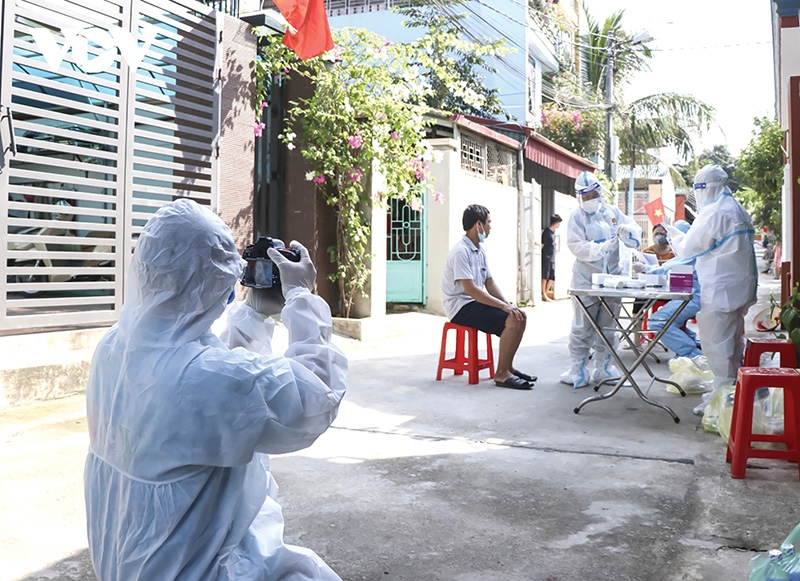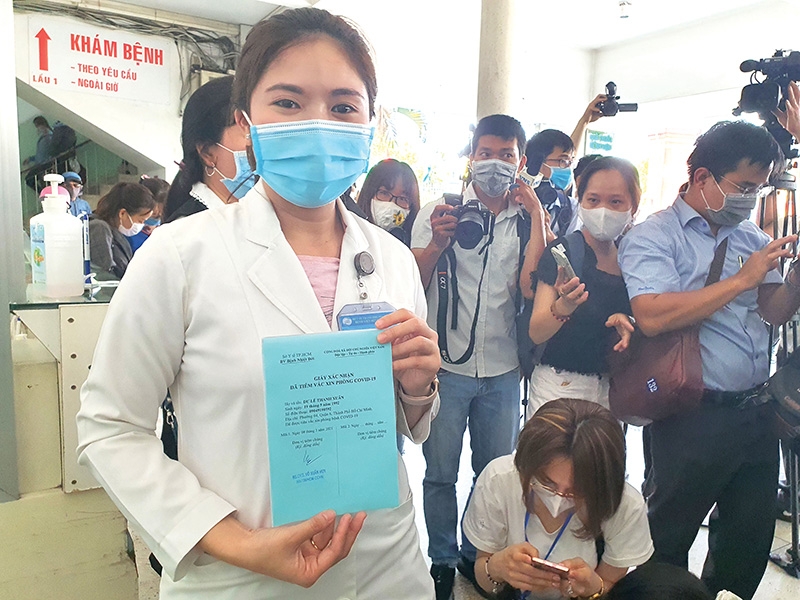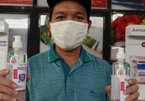Temporarily putting aside responsibilities to their families, thousands of doctors and nurses at many hospitals from central to local levels have been volunteering to go to pandemic hotspots and make an important contribution in preventing the coronavirus from spreading and fighting against the pandemic.
 |
|
Journalist Vu Xuan Tien and healthcare workers do their duty at a Ho Chi Minh City pandemic hotspot. Photo: Le Toan
|
Nearly a month has elapsed since doctor Hoang Van Tiep received a new assignment in Bac Giang province. The 26-year-old, the youngest member of the medical support team from Yen Bai province, has gradually gotten used to the feeling of heat when wearing tight protective suits and working continuously from early morning until late at night.
It has been many days since he entered the pandemic prevention centre, and he has not had much time to call or visit his loved ones. Even before leaving, he did not have time to go to his parents because he only had one hour to prepare his belongings, while his home was nearly 200km from the new workplace.
Tiep’s story is typical for hundreds of doctors and nurses who have volunteered to go to Bac Giang to support. After COVID-19 began to spread strongly in four industrial zones, causing the number of infections to spike every day, Bac Giang’s health authorities received timely support from many medical delegations from many different localities.
Doctors and nurses appeared from all parts of the country. Many of them are unmarried, but there are also those who were willing to give a baby just a few months old to their parents. Most of them, when applying to volunteer in Bac Giang, left the return date blank. Their silent sacrifice has made the fight against COVID-19 in pandemic-hit areas like Bac Giang less painful.
 |
|
Dr. Du Le Thanh Xuan from the Hospital for Tropical Diseases delayed her wedding to join the COVID-19 protection team
|
Silent sacrifices
Responding to the Ministry of Health’s call for the health sector to work with Bac Giang, doctor Phan Van Chung, head of the delegation of Danang Hospital C, and six other doctors and nurses were present at the intensive care unit located at Bac Giang Psychiatric Hospital in early June.
Chung confided that he regularly monitored news from the pandemic centre, so he understands the complexity of the outbreak in Bac Giang. That is why, when he heard that Danang Hospital C would send a medical team and doctors to support Bac Giang, he volunteered to participate.
The group left the next day and drove in their own cars to the pandemic centre. The trip had no return date, but Chung and his colleagues agreed to stay in Bac Giang to support until the pandemic is completely controlled. “Before leaving, the male members of the delegation decided to shave their heads to reduce heat and entanglement when wearing protective suits, and also to be safer and avoid infection when working for a long time,” said Chung.
Similarly, Pham Thi Hue, a 23-year-old nurse, cut her favourite long hair to facilitate the care of COVID-19 patients.
Hue is a nurse at Quang Ninh General Hospital. She started treating F0 patients at the intensive care unit at Bac Giang Psychiatric Hospital from the beginning of June.
She shared, “I used to wear tight protective gear and work from 6am to 2pm, so I would be able to adapt to the upcoming work. However, some doctors who treated COVID-19 patients said that long hair needs to be cleaned and washed a lot every time they go in and out of the ward. Therefore, I decided to cut my hair short for convenience.”
Meanwhile, the clip of a 20-month-old girl crying when hearing her mother’s voice on TV received much attention. The mother of the baby in the clip is Phung Thi Hanh, a nurse from Hanoi’s Military Hospital 103 who has been on duty at the No.2 field hospital in Bac Giang since mid-May.
In the early days, she constantly felt ill due to blocked breastmilk and missing her child. But the intensity of working for nearly 12 hours a day made her gradually calm down. Hanh said that normally she is not a weak person, but when she saw the tears of her children, she could not bear it.
“When I am working, I miss my baby and cry. I have never been away from my child for a day, so it was very heartbreaking,” the nurse confided.
Proud to be out in battle
The spirit of dedication and personal sacrifice to focus on the fight against COVID-19 is not only common among the medical staff working at hospitals but also medical students who are participating.
“COVID VUTM hunting squad” is the name of a group of 37 lecturers and students from the Vietnam Academy of Traditional Pharmacy who were sent to Bac Giang to support the fight against the pandemic. For them, the summer of 2021 concludes their “most meaningful days”.
The temperature of nearly 40 degrees Celsius during these days is the biggest obstacle for the group. Multilayer protective clothing makes outdoor sampling extremely difficult. The phenomenon of dizziness due to heat shock is inevitable, but they always encourage each other to try to overcome the situation.
Meanwhile, Bac Ninh province also recorded enthusiastic support from groups of volunteering medical students. From the beginning of the year, Ngo Thi Ngoc Bien, currently a third-year student at Hai Duong Medical Technical University, has had two volunteer trips to Hai Duong and is currently in Bac Ninh.
Bien said, “I think youth is fleeting, so you have to go out and do meaningful things. As the COVID-19 pandemic has not ended, my hometown has not been safe. But this is a small step forward in my medical career.”
Perhaps, the ideals of youth and the desire to devote themselves to in order to return a peaceful life is a source of strength for these frontline soldiers. But, it goes without saying, Vietnam’s future doctors will continue to constantly toil and sweat in order to win the race against the pandemic.
Source: VIR

COVID survivor makes disinfecting machines, donates all to frontline workers
Mai Anh Duc directed production for sanitizers and disinfecting devices remotely while still being treated for Covid-19, and donated them all to hospitals and quarantine zones across Vietnam.